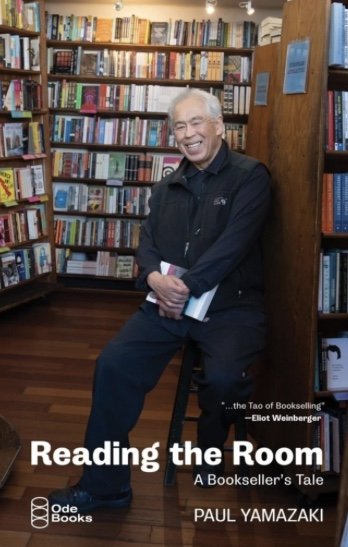Reading the Room by Paul Yamazaki (Ode Books)
There are only a few legendary bookstores in the world--Foyles of London, Shakespeare and Company in Paris, and San Francisco’s City Lights, Booksellers and Publishers. Foyles is famous for having thirty miles of books, Shakespeare and Company for being a magnet for 20th Century literary giants--Hemingway, T.S. Eliot, Gertrude Stein. City Lights was co-founded by one of the most famous Beat poets, Lawrence Ferlinghetti and then became well-known for publishing Allan Ginsberg’s Howl, when nobody else dared to put it into print.
Its luster has been quietly enhanced over the past fifty years by a man who is famous only to writers, publishers, and other booksellers. Paul Yamazaki has shaped and sharpened the collection of books that fill the shelves at City Light since 1970, only now being revealed in a book of his own. Appropriately, this is a series of conversations with other booksellers, in a book that has been published by another bookstore, Chicago’s Seminary Co-op.
Yamazaki came to San Francisco in 1967, walking the streets of Haight-Ashbury in a pair of wing-tip shoes, dressed in a London Fog jacket and brown slacks. He arrived to go to college at his parents’ insistence and the college he chose was a hotbed of dissent, San Francisco State. Not an academically-minded student and admittedly “more conservative than my parents,” this former high school football player immersed himself in the politics of the time, becoming a member of the Asian American Political Alliance. Thrown in jail for “inciting a riot,” a young poet who worked at City Lights convinced Ferlinghetti to get Yamazaki an early prison release by hiring him to work at the bookstore. He’s been there ever since.
“Yamazaki, you work in a bookstore--this bookstore?” his high school English teacher demanded when he encountered his former “memorably bad” student in the aisles of City Lights. Yamazaki doesn’t say what his job was by that time but he went from packing boxes of books to selecting the 30,000 titles that are placed on the bookstore’s shelves. He was instrumental in the decision to go from a store that sold only paperbacks to one that included new release hardcovers, a decision that saved the store from closing its doors forever. It’s now celebrating its 70th anniversary.
“We average 1.3 copies per title,” Yamazaki says, on shelves so tightly packed that booksellers have to move a small library in order to make room for a new volume. And shelving is not a casual activity--Yamazaki wants the shelves to create “a shimmering conversation between the books. When they’re placed side by side, they talk to one another.”
His goal is to fill the store with books that offer “possibility and resistance,” and the joy that comes with “happiness through knowledge.” “We’ve never been looking for comfort,” he says, “Curiosity is a fundamental tool of a bookseller.”
“At a great store, you can look through twelve well-selected serendipitous linear inches to find a universe.” In City Lights, a bookstore that’s on the site of a former church and a topless barber shop, Paul Yamazaki has shaped a multitude of challenging, joyful universes. ~Janet Brown
